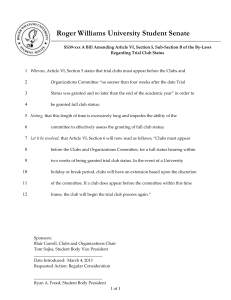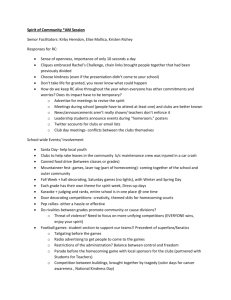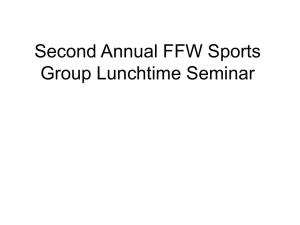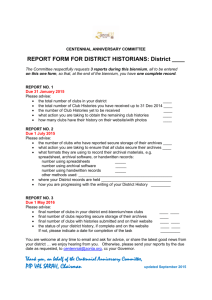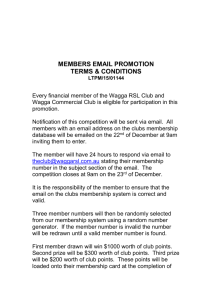CLUBS - Parliament of New South Wales
advertisement
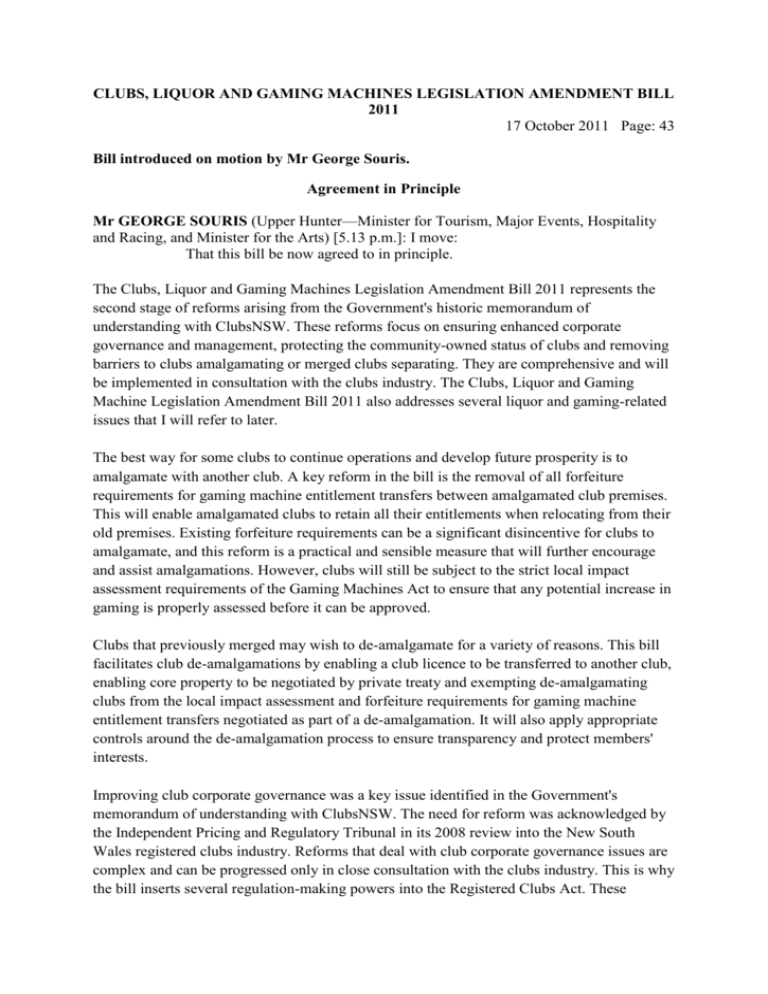
CLUBS, LIQUOR AND GAMING MACHINES LEGISLATION AMENDMENT BILL 2011 17 October 2011 Page: 43 Bill introduced on motion by Mr George Souris. Agreement in Principle Mr GEORGE SOURIS (Upper Hunter—Minister for Tourism, Major Events, Hospitality and Racing, and Minister for the Arts) [5.13 p.m.]: I move: That this bill be now agreed to in principle. The Clubs, Liquor and Gaming Machines Legislation Amendment Bill 2011 represents the second stage of reforms arising from the Government's historic memorandum of understanding with ClubsNSW. These reforms focus on ensuring enhanced corporate governance and management, protecting the community-owned status of clubs and removing barriers to clubs amalgamating or merged clubs separating. They are comprehensive and will be implemented in consultation with the clubs industry. The Clubs, Liquor and Gaming Machine Legislation Amendment Bill 2011 also addresses several liquor and gaming-related issues that I will refer to later. The best way for some clubs to continue operations and develop future prosperity is to amalgamate with another club. A key reform in the bill is the removal of all forfeiture requirements for gaming machine entitlement transfers between amalgamated club premises. This will enable amalgamated clubs to retain all their entitlements when relocating from their old premises. Existing forfeiture requirements can be a significant disincentive for clubs to amalgamate, and this reform is a practical and sensible measure that will further encourage and assist amalgamations. However, clubs will still be subject to the strict local impact assessment requirements of the Gaming Machines Act to ensure that any potential increase in gaming is properly assessed before it can be approved. Clubs that previously merged may wish to de-amalgamate for a variety of reasons. This bill facilitates club de-amalgamations by enabling a club licence to be transferred to another club, enabling core property to be negotiated by private treaty and exempting de-amalgamating clubs from the local impact assessment and forfeiture requirements for gaming machine entitlement transfers negotiated as part of a de-amalgamation. It will also apply appropriate controls around the de-amalgamation process to ensure transparency and protect members' interests. Improving club corporate governance was a key issue identified in the Government's memorandum of understanding with ClubsNSW. The need for reform was acknowledged by the Independent Pricing and Regulatory Tribunal in its 2008 review into the New South Wales registered clubs industry. Reforms that deal with club corporate governance issues are complex and can be progressed only in close consultation with the clubs industry. This is why the bill inserts several regulation-making powers into the Registered Clubs Act. These powers will allow for the development of a mandatory training framework for club directors and managers. Comprehensive discussions will occur with the clubs industry and registered training organisations to develop training frameworks that meet the individual needs of club directors and managers. The Government and the clubs sector will consider how the training can be progressively introduced to reduce the cost impact on clubs. The bill also inserts other regulation-making powers to enable matters to be prescribed relating to voting eligibility for various classes of club members, a definition of the core features of a registered club and the circumstances where a club board will be permitted to appoint club directors. These issues were identified by the Independent Pricing and Regulatory Tribunal as requiring reform to ensure that club boards are functional, represent the interests of all members and are effective. However, these issues are also contentious and need to be approached sensitively. Ideally, the Government and clubs industry representatives will be able to encourage and support clubs to address these matters voluntarily. However, the reserve powers in the bill to intervene via the making of regulations are necessary to ensure action can be taken in the event that these matters are not addressed voluntarily. The bill also inserts regulation-making powers into the Registered Clubs Act to facilitate mandatory three-year rolling elections if required. ClubsNSW has requested that a requirement for three-year rolling elections be mandated to enhance board stability. It will also help to address concerns where funds spent on director training are wasted because of the short time some directors are appointed to club boards, and facilitate board renewal. While the Registered Clubs Act already provides for clubs to voluntarily adopt three-year rolling elections, inclusion of regulation-making powers to mandate this requirement will send a message to the clubs industry about the importance of this issue. The clubs industry has expressed concern that some boards are quite large and at risk of being inefficient or dysfunctional. Therefore, this bill amends the Registered Clubs Act to provide for a maximum limit of nine board members of a registered club. The industry has indicated that it is important there is consistency across all clubs and that a maximum of nine directors is an appropriate cap. The necessary transitional arrangements will be developed with the clubs industry to ensure there is an orderly introduction of the nine-member limit. Protecting our registered clubs and their assets from falling into the hands of private interests is vital to help the ongoing viability of the clubs industry. Significant concerns were raised recently about private takeovers of clubs or financial and management contracts entered into between vulnerable clubs and private companies. The clubs industry contends that these companies may seek to take control over governance of a club to gain a share of the club's profits or property. This bill will implement several measures to help ensure financial and management contracts comply with the law and are in the interests of clubs and their members. First, clubs will be required to notify members of a proposal to enter into a contract whereby the core property of the club is, or will be, used either directly or indirectly as security. Members can then voice any concerns directly with their club or, if necessary, to the Office of Liquor, Gaming and Racing. Clubs will also be required to provide a report on the proposed contract to the Director General of the Department of Trade and Investment, Regional Infrastructure and Services for review and comment. If the director general finds that the management contract does not comply with the legislation or is not in the interests of the club or its members, he or she may direct the club to amend the terms of the proposed contract, not to enter into the proposed contract, or to terminate the contract if it has already been entered into. If the contract has been entered into, the club may be required to show cause why the contract should not be terminated. An aggrieved club may seek a review by the Casino, Liquor and Gaming Control Authority. The bill also amends the Registered Clubs Act in order to strengthen the requirement for clubs to be conducted in good faith by more clearly identifying factors that could be indicative of the club not being so conducted. These include circumstances where clubs may be under continuous administration for an exceptionally long period or where arrangements have resulted in effective control of the club and its revenues being passed to a contractor or other party. The regulation-making power is also provided so that other factors may be prescribed in the future, if necessary. To better emphasise the not-for-profit member-based nature and status of clubs, the bill clarifies the principles governing benefits or advantages received from clubs. The bill also strengthens requirements to ensure that club operations are adequately controlled and supervised by the club manager and board. Our service veterans' exceptional contribution to our country deserves special recognition. That is why I am pleased that the bill will result in ex-service men and women who are service members of the RSL no longer needing to sign in when entering an RSL or services club. This reform will also apply to Australian Defence Force personnel as an appropriate recognition for their service to our nation. The bill introduces a defence provision for club managers, where reasonable steps have been taken to comply with certain liquor laws. A similar defence provision previously existed under the Registered Clubs Act. Consistent with that previous legislation, a defence will not be available for the offence of permitting intoxication, nor will a defence be available where a specific defence is already available in the Liquor Act or where the Act provides that a club manager is guilty for failing to comply with a direction without reasonable excuse. The bill also makes another important club industry reform by removing the ability for royal commission-style investigations to be conducted under section 41X of the Registered Clubs Act. This reform is advanced because more appropriate and effective investigative powers already exist under the Registered Clubs Act and under the crimes legislation. I turn now to the liquor-related reforms in the bill. The bill will amend the primary purpose test in the Liquor Act to enable hoteliers to trade at certain times of the day without the need to sell liquor but to continue to provide other services such as non-alcoholic beverages, food, entertainment and conference facilities. This reform will also help to decouple liquor and gaming by allowing hoteliers to operate gaming machines without the need to have liquor available, thereby helping to address concerns about poker machine players playing under the influence of alcohol. The reforms will also potentially limit late-night liquor sales in venues that operate gaming machines, as well as allowing hoteliers to diversify early morning operations away from liquor and gaming operations by allowing hotels to open for breakfast or provide other non-gaming services. These reforms will help to create safer hotels and reduce levels of alcohol-related harm as well as helping to reduce the incidence or intensity of problem gambling by players who are under the influence of alcohol. There is a range of existing controls to prevent hotels from focusing their day-to-day business on gaming, including a mandatory daily shut-down of gaming machines, a prohibition on advertising gaming machines, and controls on the location of machines in hotels. To address concerns that hoteliers may apply for extended trading to operate gaming machines, the bill specifically provides for regulations to be made so that the impact of gaming is addressed in a community impact statement that must accompany an application for permanent extended hotel trading. The Government will develop the necessary regulations prior to the commencement of these provisions. The bill introduces a new power relating to directions that can be issued to a licensee who sells liquor or to the operators of other licensed premises, such as a licensed caterer. These directions will allow limits to be placed on the use of an authorisation to sell liquor away from the licensed premises, including controls on trading hours and preventing the exercise of the licence. This will help to ensure that a licence cannot be used in a way that undermines the integrity or the objects of the liquor laws. For many years the Liquor Act has provided an exemption from the requirement to obtain a liquor licence for gift sellers who may include up to two litres of liquor as part of a gift of flowers or food that is delivered to a third person. Some vendors have recently sought to exploit this exemption by delivering packaged liquor late at night that was included with a small amount of food such as a packet of chips or similar snack food. These deliveries have the appearance of home delivery liquor, rather than genuine gift sales. The bill will therefore strengthen controls by requiring that vendors who take advantage of the exemption must market a genuine gift service, package the gift in a way that the recipient would assume it to be a genuine gift and limit delivery hours to between 7 a.m. and 7 p.m. To ensure that legitimate vendors are not adversely affected by delivery delays, the bill acknowledges that there can be unforeseen circumstances that may delay the delivery of the gift. The bill also introduces a range of miscellaneous amendments to the Gaming Machines Act regarding the cap and trade scheme that controls the distribution of gaming machines at clubs and hotels. These amendments aim to improve the operation of the gaming machine threshold scheme, particularly to address legislative gaps regarding poker machine permit trading. The reforms will also bring permit trading into line with gaming machine entitlement trading to ensure a level playing field between hotels and clubs and improve the overall integrity of the gaming machine threshold scheme. The bill makes several other miscellaneous reforms. It will change the name of the Casino, Liquor and Gaming Control Authority to the Independent Liquor and Gaming Authority in order to better reflect its role. The bill will confirm that the authority has the power to reduce liquor trading hours when imposing conditions on a licence and to apply appropriate penalties to offences relating to responsible service of alcohol and responsible conduct of gaming training. It will clarify the status of changes that are levied by the New South Wales Office of Liquor, Gaming and Racing for gaming-related applications and services, and, finally, it will amend the secrecy provisions to ensure that liquor and gaming information can be released to appropriate persons to promote better regulation of the industry in accordance with good regulatory practice. The bill before the House represents a landmark package of reforms aimed at ensuring the long-term viability of the clubs industry. It will help to protect the interests of club members and ensure that clubs continue to make a significant social and economic contribution to our community. It also represents a balanced and sensible approach to liquor and gaming machine regulation. I commend the bill to the House.

